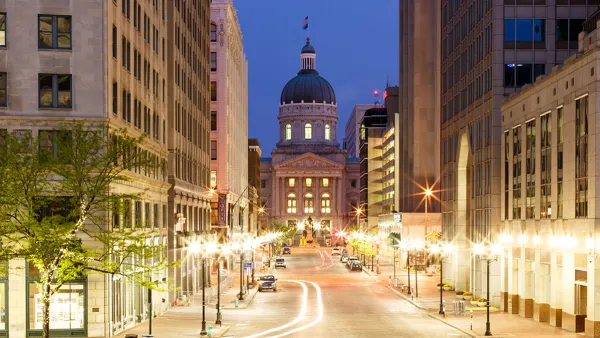When it comes to allowing voters to decide whether to increase local or state taxes for transportation, the most common option by far is the local or state sales tax. But what about income taxes; has it been tried before? And for public transit only?
Indiana Gov. Mike Pence signed a bill on Wednesday (March 26) allowing six counties to decide whether to allow voters to approve or reject a new local income tax to fund public transit improvements. Why the income tax was chosen over other options is not entirely clear, but may have been for concern of one of the governor's stipulations: that it "contain no new, local corporate tax," as WISH TV reported. Corporations pay sales taxes.
The bill overcame the opposition of the local Tea Party that we described last year.
"The law authorizes officials in Marion, Madison, Johnson, Hancock, Hamilton, and Delaware counties to seek voter permission to raise income taxes to fund a regional bus system," writes Lesley Weidenbener, adding that it also requires (county) officials to seek corporate support for the system. Indianapolis is in Marion County.
The issue that may have been the most contentious was whether to allow counties to consider funding light rail - which Gov. Pence appeared to have decided. In addition to stipulating "no corporate taxes", he indicated he would not have signed had light rail been allowed. In his signing statement, he wrote that light rail would have "greatly increased the cost to taxpayers in the long term," WISH TV indicated.
"The bill passed with support from a broad coalition of local officials, business leaders and environmental groups that argued a modern mass transit system is necessary to keep the region vibrant," adds Weidenbener.
Tim Maloney, senior policy director for the Hoosier Environmental Council, said the law will "help central Indiana move ahead in planning and building an environmentally-friendly and economically-valuable public transportation system for the region."
According to Barb Berggoetz and Tony Cook of The Indianapolis Star, "...it's unlikely local governments will move to bring the issue to voters this November. Many expect it to take at least until 2015 before voters will get a chance to weigh in."
The law allows counties to raise local income tax rates by .1 to .25 percent to fund mass transit projects. In Marion County, local income taxes could rise from 1.62 percent to somewhere between 1.72 percent and 1.87 percent.
The day after signing the transit referendum bill, Pence signed a $400 Million Road Funding Bill. Unlike the transit bill, no referendum or new taxes is required in House Bill 1002 to increase spending on roads (see Planetizen: "In Indiana, Highway Building Is an End in Itself"). Money need only be transferred from the state's general fund.
Correspondent's note: In Oregon, which has no sales taxes, Portland's Tri-Met operations are funded by a Transit Payroll Taxes for Employers," paid by employers, not employees.
FULL STORY: Pence signs Central Indiana mass transit bill

Analysis: Cybertruck Fatality Rate Far Exceeds That of Ford Pinto
The Tesla Cybertruck was recalled seven times last year.

National Parks Layoffs Will Cause Communities to Lose Billions
Thousands of essential park workers were laid off this week, just before the busy spring break season.

Retro-silient?: America’s First “Eco-burb,” The Woodlands Turns 50
A master-planned community north of Houston offers lessons on green infrastructure and resilient design, but falls short of its founder’s lofty affordability and walkability goals.

Test News Post 1
This is a summary

Analysis: Cybertruck Fatality Rate Far Exceeds That of Ford Pinto
The Tesla Cybertruck was recalled seven times last year.

Test News Headline 46
Test for the image on the front page.
Urban Design for Planners 1: Software Tools
This six-course series explores essential urban design concepts using open source software and equips planners with the tools they need to participate fully in the urban design process.
Planning for Universal Design
Learn the tools for implementing Universal Design in planning regulations.
EMC Planning Group, Inc.
Planetizen
Planetizen
Mpact (formerly Rail~Volution)
Great Falls Development Authority, Inc.
HUDs Office of Policy Development and Research
NYU Wagner Graduate School of Public Service


























